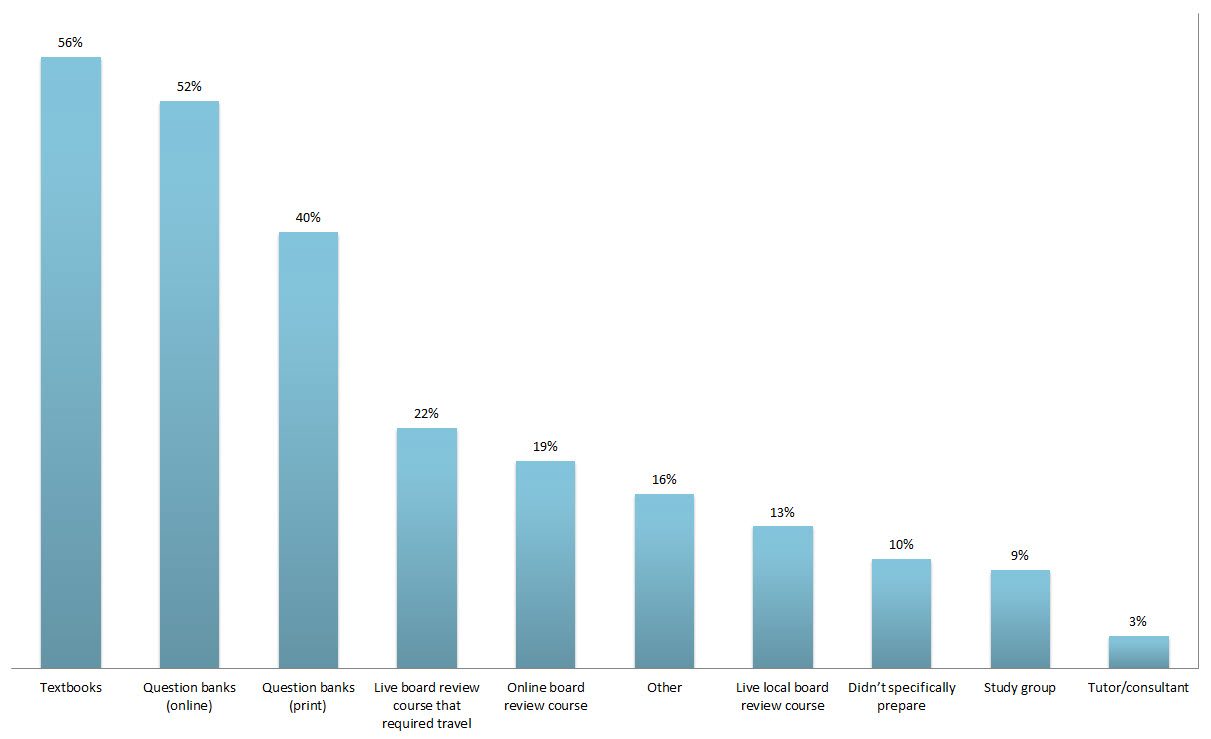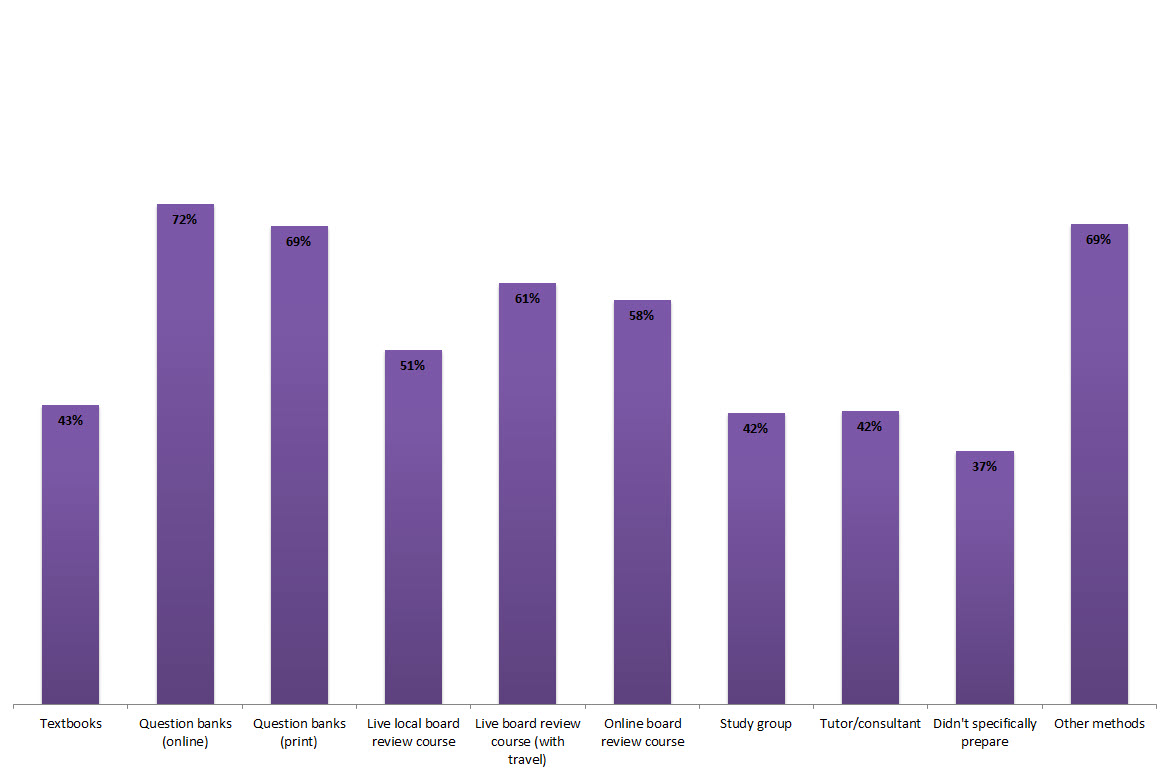Best Im Board Review First Time Prep Courses Online
A recent survey of Physician's Outset Spotter readers conducted by NEJM Knowledge+ found that physicians reported using textbooks and question banks much more than frequently than internal medicine board review courses. Indeed, only nigh a third of the more than 900 respondents report having attended concrete board review courses — either locally or requiring travel — while simply ane in v report calculation online courses to the mix as they fix for board certification exams.
Study Methods Used

In rating the effectiveness of their study methods, physicians rate internal medicine board review courses somewhat more favorably than contained study using textbooks (the most widely-used method), but somewhat less favorably than independent report using print or online question banks.
Study Methods: Percent of "Highly Effective" Ratings

Plenty of Options for Internal Medicine Lath Review Courses
Of several basic options — courses offered locally, those requiring travel, prerecorded, cocky-pacing, and online courses — lath review courses requiring travel edge out the more user-friendly options for perceived efficacy, according our physician survey.
To understand more nearly physicians' experiences with board review courses, nosotros interviewed a number of survey participants and found a wide diverseness in both reasons for enrolling and in physicians' personal criteria for selecting specific course offerings. Key reasons physicians share for enrolling in internal medicine board review courses include:
- Fear of not passing their exams or not feeling confident nearly how to focus their studies independently.
- Learning-manner preferences for visual/sound presentations and/or interactivity with other people.
- Want to study specific exam-style questions and to benefit from multiple expert lecturers teaching to established exam blueprints.
"[Both of the courses I took] were highly-seasoned because of their structure," says Dr. Roy Kao, who achieved his initial ABIM internal medicine board certification in 2011 and certified in pediatrics the post-obit year. "Over the grade of near a week, different experts in subspecialty fields and full general medicine went over important loftier-yield topics in a systematic fashion that is attuned to the content specifications and previous question formats of the board exams."
Reputation, Fourth dimension, and Cost
In choosing specific internal medicine lath review courses, most physicians announced to strongly consider producer reputation, fourth dimension, and cost. For example, in studying for his spring 2014 ABIM recertification test, general internist Dr. Reynaldo Alonso of the Bronx, NY knew his learning preference would be for a alive course:
I exercise ameliorate with listening than with studying from a textbook or computer screen. While I would have preferred a live course, I could not take the fourth dimension off to travel for the course I wanted. Instead, I purchased the recorded/audio version, which was less expensive and immune me to break up my studying into smaller time increments — an 60 minutes or 2 during evenings or weekends — and to fit the studying more easily into my schedule.
As a practicing general internist who makes regular efforts to stay upwardly to date in his medical knowledge, Dr. Alonso says that the approximately xx-60 minutes audio grade was just right for his needs.
I would remember the internal medicine board exam might be more daunting for those who take specialized in their careers but notwithstanding wish to maintain their internal medicine certifications. As a general internist, I encounter many dissimilar things every day in practise, so this grade was all I really needed to experience confident and to laissez passer my exam.
Dr. Kao, meanwhile, says he has chosen both live and prerecorded (DVD) courses; again, his choice was driven primarily by the criteria of reputation, time, cost, and proximity.
For my internal medicine boards, I chose a live course, but for pediatrics, I selected a DVD course. I chose the live course because it was relatively nearby, and I had an opportunity to stay with friends. I was besides able to take off an entire week to devote to the course. My residency program provided educational funding, and the class was created by a reputable organization. Besides, there was no DVD option for the particular form I had chosen, while other DVD courses were available to me through my residency library.
For pediatrics, I chose a DVD option due, again, to the course creator's reputation and my own previous experience taking DVD courses offered by the particular producer. While in that location was a live course option, the altitude was also far from home and travel was not feasible for me. I also appreciated the ability to slow downward and speed upwards the DVD and to repeat sections to fit my ain pace of review.
Dr. Holli Hamilton, who might exist considered a "super certifier," holds multiple certifications in internal medicine, infectious disease, and preventive medicine and public wellness, and has passed at to the lowest degree half-dozen board certification exams. She has, throughout her career as a regime researcher, enrolled in an even larger variety of internal medicine board review courses (local, distant, and online or self-administered).
The real do good with online courses is that you can log in someday, so they are a good fit when you cannot put together the blocks of time needed for live courses. When my children were modest, I volition admit I preferred the longer-altitude courses, considering existence away from the daily demands of family unit life made it much easier to focus on review. When yous nourish courses locally, it can be more difficult to split up from your daily concerns and to focus just on the course material.
While Hamilton's overall approach to medical learning plants her firmly in the "lifelong learner" camp — she keeps upwardly with medical journals, enjoys testing her own noesis frequently with questions, and has even participated as a lath-exam beta tester — she does feel that lath review courses can be effective supplements to other forms of learning and studying.
Medicine grows more than complicated each year, and the noesis base is growing exponentially. It can be particularly difficult for those who have specialized to go back and recertify in general internal medicine because they don't see all the things general internists meet oft in exercise. The reverse is besides truthful. Subspecialty exam segments can include questions around rare occurrences of diseases that specialists would know only that would exist rare for generalists to ever see. While I believe the certifying boards need to get amend at segregating test questions for different types of physicians, board review courses are a great fashion for people to notice their weaknesses and understand how to direct more in-depth studies in preparation for their exams.
Plumbing equipment Internal Medicine Board Review Courses into Your Schedule
Deciding when to schedule an internal medicine lath review form can be somewhat catchy. On the ane paw, physicians may be inclined to enroll in courses very close to their examination dates in lodge to maximize memory retention of the cloth covered. Dr. Hamilton advises a different tactic:
You want to have your grade far enough alee of fourth dimension for it to be useful in directing supplemental study. Internal medicine board review courses will often cover newer content that you might need to know. They are very good at bringing physicians upwards-to-date in areas where they may non have concentrated their own consumption of medical research, journals, and so forth. Lath review courses are a great way to gain insights into the areas where you need to study more and review relevant enquiry and literature prior to taking your exam. Yous want to make sure that you leave yourself sufficient fourth dimension to do that follow-upward written report.
Dr. Kao would agree:
Both of the courses I took were psychologically reassuring. While the universe of what there is to know in medicine is almost infinite, it was a relief to know information technology is possible to become through [what the boards view as] the nearly of import points of medicine in ane week! That way I could focus more on the parts of the review course in which I had weaknesses. This helped my confidence more than anything else. When I actually took the boards, I based my answers for 50% of the questions on applied experience; another thirty% of my answers were based on experience with practice questions. The number of extra questions I could answer because of the board review courses was probably between five and 20%, just that small margin was very comforting in terms of helping me to prioritize my time.
Lifelong Learning vs. Lath Review Courses
An interesting perspective on internal medicine board review courses and preparation for board certification in general comes from Dr. John Wolfe Blotzer, who has worn many hats throughout his medical career, including main resident, fellow, educator, academic dean, residency program director, clinical practitioner, and even a board-review grade lecturer.
While recently retired, Dr. Blotzer also holds multiple board certifications (internal medicine, rheumatology, and geriatrics), and while he is grandfathered with lifelong certification in internal medicine, he still chooses to undergo regular assessments of his medical cognition and to recertify at recommended (albeit not required) intervals throughout his career.
I believe all physicians accept an ethical duty to stay upwards-to-date with their medical knowledge and have never believed that I should be held to a different standard than others in the field. In the early 2000s, I sabbatum for three lath exams within a short fourth dimension frame. It was exhausting, but I truly believe in the importance of keeping upward-to-engagement.
As for his own study methods, Dr. Blotzer, similar Hamilton, falls more into the "lifelong learner" category, voraciously consuming medical journals, compilations of medical research abstracts (such equally NEJM Journal Watch), taking frequent reward of self-assessment tools (such as NEJM Noesis+, MKSAP, and ACR Care assessments) and also making a betoken of regularly disseminating interesting medical content to his colleagues and following up with discussion.
Every bit an experienced medical educator who has also studied kinesthesia and curriculum development, I don't believe the lecture format is a particularly proficient way to teach. I am more in favor of taking a consistent and systematic approach to updating medical knowledge every twenty-four hour period. I believe you larn and retain more knowledge by taking in small amounts each solar day, using questions to examination your retention and going back to report and aggrandize your knowledge around the answers you get wrong. My own approach is to look at questions and really endeavor to research the answers where I either don't know or answer incorrectly.
That approach seems to be working well as Dr. Blotzer says he has passed each certification or recertification examination both with high scores and without other specific preparation or board review courses. What is more, through all the years he has been certifying and recertifying, Dr. Blotzer feels the examinations take been getting easier.
Asked how he might advise others who are preparing for medical board certification and considering courses, Dr. Blotzer says that, above all else, he would recommend introspection about individual learning styles, understanding varying practice settings (for example, academic versus purely clinical), and maintaining habits for staying upward-to-date with medical knowledge.
There is no single best arroyo to preparing for medical lath exams. When someone asks me for communication, my showtime question is always going to be: "How practise y'all acquire?"
Dr. Kao, for his part, advises taking time off from practice and ensuring focused and well-structured report fourth dimension. "Doing so can be extremely helpful, especially early on in the studying procedure, considering it is important to be able to identify specific knowledge deficits and to direct farther intensive review. I might besides urge my colleagues to consider DVD or other self-regulated courses, as they allow people to move at their ain step."
What is your experience with internal medicine board review courses? Join the chat either by commenting beneath or contacting our web log'south editors.
More from NEJM Knowledge+ and the Learning+ Web log:
Best Learning Practices
What's Your Report Mode?
How Do You Prepare for Your Board Examination? Survey Results
ABIM Review — Employ Reflection to Better Your Performance
Comments are closed.
Source: https://knowledgeplus.nejm.org/blog/internal-medicine-board-review-course/

0 Response to "Best Im Board Review First Time Prep Courses Online"
Post a Comment